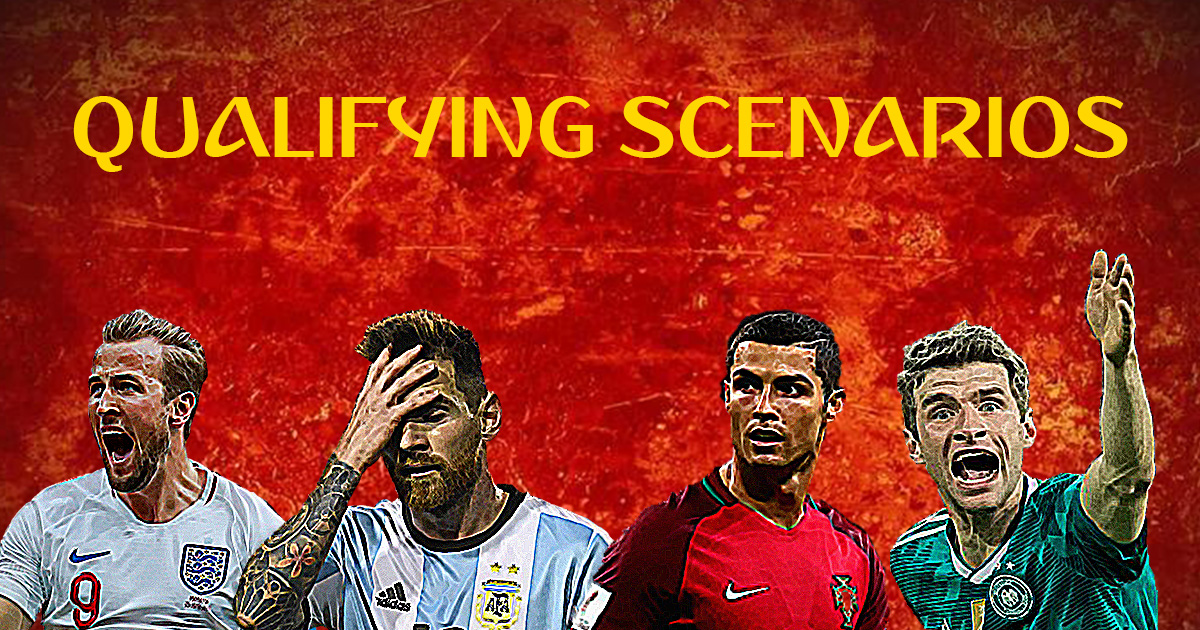FIFA World Cup 2018 | How teams can advance to the knockout stages
Apart from the obvious qualification criteria of the two teams topping a group, FIFA has also put up as many as seven different parameters, which would help them decide who qualifies in case the points are the same. We look at how all the eligible teams can make it to the knockouts of the World Cup.

Let's start off with the rules that FIFA have come up with in case multiple teams finishing with the same points. If teams finish level on points, the first method to set teams apart would be by comparing the goal difference. If that does not help, the total number of goals scored in group matches will be considered. If and when that too cannot segregate the teams, which has already been the case with multiple groups, the head to head calculations would come into the equation. The total number of points won in the group between the two teams concerned would then be considered which will be followed by the goal difference in group stages between the two teams.
If that remains same too, the number of goals scored in the group matches between the teams will be taken into account. And, if all these parameters fail to choose the qualifier, only then would FIFA resort to fair play points that would be determined by red and yellow cards obtained at the end of the group stages, following which they would switch to a more archaic way - the drawing of lots.
Group A
The first group looks pretty much set after two game weeks. After the hosts started off quite magnificently, garnering six points in two games that saw them scoring a whopping eight goals and conceding one, their seat in the knockout stages is already sealed. They are followed by World Cup veterans Uruguay who, with just two goals in two games, have the same points but with relatively quiet displays. However, Uruguay

 © FIFA World Cup
© FIFA World CupUnfortunately, the other two sides- Egypt and Saudi Arabia - have already booked their tickets back home after losing their first two respective games. They face each other in the last match of the group stages where the result remains insignificant and inconsequential as a win for either team would amount to nothing.
Group B
The tournament starts getting more interesting as we move down the groups and Group B reflects just that. Both the powerhouses of the group – Spain and Portugal - have garnered 4 points each with a win and a draw against each other. What this means for them is that if they win their respective games by the same scoreline, not only are they through to the knockouts, there could be a chance that they would they would need to spend some time analyzing who actually won the group with both Spain and Portugal scoring and conceding the same number of goals. This would mean that the top spot would be awarded to the team that has a better disciplinary record at the World Cup. Currently, Spain

 © FIFA World Cup
© FIFA World CupBut it isn't as
Group C
The topper of the group, France, has already secured a place in the knockout stages with two wins and six points from their opening two matches against Australia and Peru. However, unlike Russia, they have gone about their way in an underwhelming manner given their squad, scoring only thrice and conceding a goal in those games. They face Denmark, who sit with four points in the second position and although they are yet to qualify, are their next opponents and could still end up losing their top spot by losing their final game. However, only a win would facilitate that as France lead them by two points.

 © FIFA World Cup
© FIFA World CupThe intriguing part comes on the second-half of the table. Despite Denmark coming agonizingly close to advance as table toppers, there is even a chance that they might make it to the knockouts.
Group D
This group remains wide open for the bottom three sides with Croatia already securing their qualification. The Vatreni, led by Luka Modric, will face a winless Iceland side in their final game and where a win, draw, or a loss could hardly affect their table-topper status given their superior goal difference (+5). The side closest to Croatia is Nigeria, who have managed one win against Iceland after opening their World Cup campaign on a losing note against Croatia. They face of two-time winners Argentina and while a win would

 © FIFA World Cup
© FIFA World CupWhile on paper Argentina
Group E
While Brazil isn’t as swimming in deep waters like their archrivals Argentina, they are far from advancing into the knockout stages. They face a tricky side in Serbia, who are just one point behind Brazil, in the last game and could qualify even if they don’t win the match, although losing doesn’t remain an option for the Serbs. Switzerland stay in pole position to advance after a hard fought win over Serbia last game as they face a winless Costa Rica. In case of a draw against Costa Rica, Switzerland would still go through provided Brazil defeat or play a draw with Serbia in the other game.

 © FIFA World Cup
© FIFA World CupSerbia
Group F
This group, too, remains as open as ever for the first three teams. Despite Mexico winning their two opening games, they would depend highly on their last match against Sweden to assure qualification. Given that they are enjoying a goal difference of +2, they would hope not to lose by a margin of three goals against Sweden and Germany beating Korea by the same margin, as that would not only topple them from the top spot but also eliminate them from the group stage.

 © FIFA World Cup
© FIFA World CupSweden’s qualification stands on sticky grounds. A win only wouldn’t suffice for them unless Germany
Surprisingly, Korea could still qualify from the group if they beat Germany by three goals or more and Sweden lose to Mexico.
Group G
This group has been completely dominated by the two giants - England and Belgium - and it has been to such an extent that both of them have completely ran riot over Tunisia and Panama. Both have scored eight goals against the minnows and conceded twice sitting with a goal difference +6 in the top two positions. With Tunisia and Panama scheduled to play each other, their result has been reduced to a mere formality.

 © FIFA World Cup
© FIFA World CupPerhaps the most important game has been saved for the last in the group, which will be between England and Belgium. With both guaranteed a qualification, the outcome would mere decide their qualifying spots as they are winners are likely to face sides amongst Columbia, Japan, or Senegal. While a win would makes it very easy to choose their next opponent, any kind of draw would mean they remain fixed on same points with same goal difference and goal scored. Given that they have scored and conceded an identical number of goals against Tunisia and Panama, this can eventually go down to the number of bookings. It is here that their similarities end. Belgium are currently behind England by the rules of the book with three yellow cards as opposed to England’s two, and if they even each other out in the last game, then FIFA would have to make a draw for them.
Group H
The situation of the first two teams in Group H – Japan and Senegal - isn’t very different from England and Belgium. Both Japan and Senegal have scored four goals and conceded thrice so far, having a goal difference of +1. While a draw for Japan against Poland and Senegal would guarantee their qualification into the knockout stages, an identical scoreline in those games would again take it to the number of bookings for them, after they both drew 2-2 in their last game. Senegal lead by five yellow cards to Japan’s three and if Japan end up equaling it, FIFA would again have to go for a draw.

 © FIFA World Cup
© FIFA World CupHowever, apart from the win-win scenario for them where both of them qualify, there is also a big chance of one of them not qualifying. Colombia, who enjoy a better goal difference than both Japan and Senegal, have a solid chance of going ahead with a win or a draw. While a win definitely assures the South Americans of a place in the knockout stages, a draw against Senegal would also give them the ticket provided Poland beat Japan by any goal margin whatsoever.

Comments
Sign up or log in to your account to leave comments and reactions
0 Comments